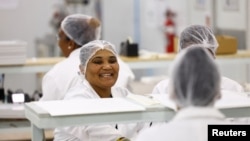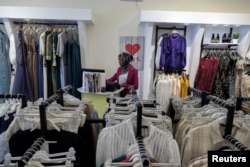A report commissioned by the Mastercard Foundation says that increasing women's participation in Africa's formal workforce could boost the continent's economy by approximately $287 billion by 2030, boosting GDP by 5 percent.
The report, Young Women in Africa: Agents of Economic Growth and Transformation by 2030, was conducted in collaboration with the McKinsey & Company consulting firm. Released last week, it examines the impact, challenges and contributions of women in the African labor force.
The report says young women are important contributors to the African economy, yet their role has been trending downward. Women's contribution to Africa's GDP declined from 18 percent in 2000 to just 11 percent in 2022, the report says.
Marguerita Bagulo is one of the millions of women employed in and contributing to the growth of African economies. She works as a customer service representative for a company in Ghana. She says her company promotes gender equality and that women fight for their jobs.
“I was lucky to be in a place where your gender is not really a problem," Bagulo said. "And it’s great, because we are given the same opportunity that our male counterparts are being given, and that, in turn, gives us the opportunity to stand up for ourselves and better ourselves in order to compete on the same level as our male counterparts.”
In Namibia, despite government policies aimed at increasing women's participation in the economic sector, their participation rate has risen only 2 percentage points, to 42 percent, over five years, according to the report.
The report notes 10 countries, most from eastern and western Africa, have the potential to achieve faster economic growth if they prioritize gender equality.
However, persistent obstacles continue to keep many women out of the labor force.
Wacu Mureithi, an entrepreneur in Kenya, says she could not continue with her hair product business because of family commitments.
“Business is hard for everyone, man and woman, but I think a woman has a bigger challenge, because sometimes, looking for business opportunities, you are trading for sexual favors instead of doing the work," Mureithi says. "But my biggest problem has been balancing trying to be mum and dad and at the same time being an entrepreneur. I felt I was losing on parenting, because I was busy with meetings all the time."
Mureithi has returned to a university to pursue further studies to better her life and that of her family.
Samuel Nyandemo, a lecturer on economics at the University of Nairobi, says more girls and women are enrolling in universities to increase their chances of joining the labor force, which is dominated by men.
“What they are mostly doing, they are in the hospitality industry, and some are in the managerial sector," he says. "In any case, you can see now when it comes to enrollment in universities, the number is now increasing, which means that in terms of job skills, they are acquiring a lot of job skills that are empowering them to spearhead most of the management positions within African economies.”
The Mastercard Foundation says private sector-led approaches, such as investing in after-school care led by young women, could create 3.2 million jobs. The researchers say women also need government-funded initiatives to expand centers to improve child care initiatives, while the private sector can help by offering technical support, resources and low-interest loans.
At least 26 percent of girls complete their secondary education, but unpaid care work keeps 35 percent to 40 percent of women from employment, the report notes.
It says that in 2021, 66 percent of women lacked access to a bank account, while 13 percent had access to formal credit, versus 16 percent for men.
Lower access to financial services for women is blamed on the types of businesses run by women, which are seen as paying less and lacking income stability.
Nyandemo says governments need to create programs that make it easier for women to participate in the economic sector.
“There should be affirmative action that spearheads the aspect of gender equality," he says. "Create more opportunities for women and empower them both economically and politically, and more so, invest heavily in training them in various small-scale business enterprises. Equip them with entrepreneurial skills and management skills.”
The Mastercard Foundation plans to invest $360 million to help more than 70,000 young women and girls complete their education, start businesses and find job opportunities.






